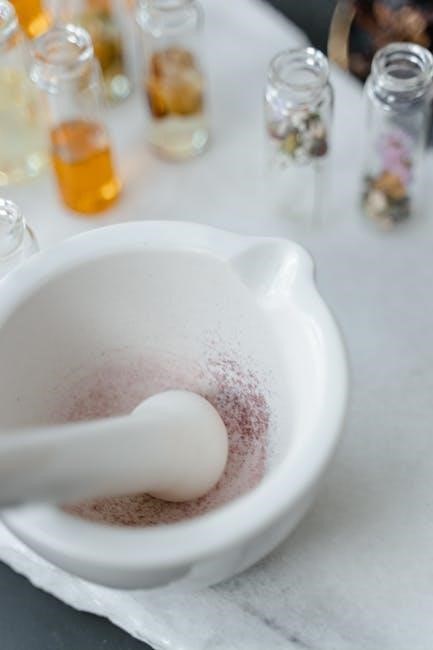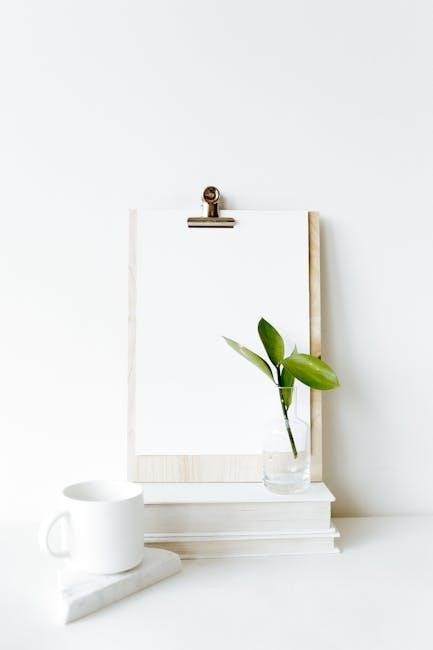Tinctures are concentrated herbal extracts, offering versatility in natural remedies. Made by steeping plants in alcohol or vinegar, they provide potent solutions for various health needs and wellness goals.
What Are Tinctures?
Tinctures are concentrated liquid extracts made by steeping herbs, roots, flowers, or berries in alcohol, vinegar, or glycerin. They capture the active compounds of plants, offering a potent, bioavailable form for health support. Unlike teas or infusions, tinctures are highly concentrated, making them effective in small doses. They are commonly used sublingually or mixed with water for various health needs, from anxiety relief to immune support. Their long shelf life and ease of use make them a popular choice in herbal medicine, suitable for both acute and chronic conditions.
A Brief History of Tinctures in Herbal Medicine
Tinctures have ancient roots in herbal medicine, dating back centuries. Early civilizations used alcohol to preserve and extract plant remedies, recognizing their potent healing properties. In traditional African and European practices, tinctures were cornerstone treatments. The method evolved over time, with advancements in extraction techniques. Today, tinctures remain a vital part of holistic health, bridging ancient wisdom with modern usage. Their enduring popularity reflects their effectiveness and versatility in addressing various health concerns, making them a timeless tool in natural wellness and herbalism.
Benefits of Using Tinctures
Tinctures offer numerous benefits, including concentrated potency and easy absorption. They are versatile, addressing various health needs like anxiety, inflammation, and immune support. Tinctures are simple to use, with sublingual or diluted options. Their long shelf life makes them convenient for storage and travel. Additionally, tinctures allow for precise dosing, catering to individual needs. They are also portable and discreet, making them a practical choice for holistic wellness. Overall, tinctures provide an efficient and effective way to harness the power of herbal medicine for optimal health.
How Tinctures Are Made
Tinctures are crafted by steeping plant material in alcohol or vinegar, then straining and storing the liquid extract in amber bottles for potency and preservation.
Materials and Equipment Needed
To make tinctures, you’ll need dried or fresh herbs, a clean glass jar, and a solvent like alcohol or vinegar. Add cheesecloth or a fine mesh strainer for filtering. Use amber glass bottles with droppers for storage to protect from light. Labels and funnels are optional but helpful for organization and pouring. Ensure all equipment is sterilized to prevent contamination and spoilage.
Step-by-Step Process of Preparing Tinctures
Combine dried or fresh herbs with a solvent like alcohol or vinegar in a clean glass jar. Store in a cool, dark place for 2–6 weeks, shaking daily. Strain the mixture through cheesecloth into a bowl, pressing gently to extract all liquid. Discard solids and transfer the tincture to amber glass bottles with droppers. Label and store in a dark, cool place. For best results, allow the mixture to steep for the full recommended time before straining.
This process ensures potency and shelf stability.

Common Solvents Used in Tincture Preparation
The most common solvents for tinctures are alcohol (such as vodka or rum) and apple cider vinegar. Alcohol is preferred for its preservative qualities and ability to extract a wide range of herbal compounds. Vinegar is a popular alternative for those who avoid alcohol, though it is less effective for certain herbs. Glycerin, a plant-based solvent, is occasionally used for its sweetness and suitability for children. Each solvent has unique properties, making them ideal for specific herbal extractions and user preferences.
Choosing the right solvent ensures optimal extraction and preservation of the herbal remedy.
Common Types of Tinctures and Their Uses
Tinctures vary widely, each offering unique health benefits. Chamomile eases anxiety, Echinacea boosts immunity, Red Clover supports women’s health, and Reishi enhances mental clarity, showcasing their diverse therapeutic potential.
Chamomile Tincture: Anxiety, Wound Healing, and Inflammation

Chamomile tincture is a natural remedy known for its calming effects, often used to alleviate anxiety and stress. It also promotes wound healing by reducing inflammation and preventing infection. Rich in anti-inflammatory properties, chamomile tincture can soothe skin irritations, such as eczema, and provide relief from menstrual cramps. Its gentle nature makes it suitable for both internal and external use, offering a holistic approach to emotional and physical well-being.
Echinacea Tincture: Immune Support and Cold Relief
Echinacea tincture is a popular natural remedy for immune support and cold relief. Known for its anti-inflammatory and antiviral properties, it helps boost the immune system and combat infections. Often used during cold and flu seasons, echinacea tincture reduces the severity and duration of respiratory issues. It is also believed to enhance overall immune function, making it a preventive health choice. Additionally, it may soothe sore throats and alleviate inflammation, providing holistic relief for seasonal ailments.
Red Clover Tincture: Menstrual Health and Skin Benefits
Red clover tincture is renowned for its ability to support menstrual health and enhance skin vitality. It helps regulate menstrual cycles, alleviating PMS symptoms like cramps and mood swings. Additionally, its anti-inflammatory properties make it beneficial for skin conditions such as eczema and psoriasis, reducing redness and irritation. Rich in vitamins and minerals, red clover tincture nourishes and hydrates the skin, promoting a healthy complexion. Its holistic benefits make it a natural choice for both menstrual wellness and skin care, offering a gentle yet effective solution for everyday health concerns.
Reishi Mushroom Tincture: Immune and Mental Clarity
Reishi mushroom tincture is celebrated for its immune-boosting properties and ability to enhance mental clarity. It supports the body’s natural defenses, fostering resilience against illness. Additionally, it promotes mental focus and calmness, making it ideal for reducing stress and improving cognitive function. Reishi’s adaptogenic qualities help balance the body’s systems, contributing to overall wellness. This tincture is often used to enhance vitality and mental acuity, offering a natural way to support both physical and mental health in a holistic manner.

Safety and Precautions
Always consult a healthcare professional before using tinctures, especially for serious conditions. Be aware of allergic reactions and potential interactions with medications. Use as directed to avoid adverse effects.
Important Considerations Before Using Tinctures
Before using tinctures, consult a healthcare professional, especially for serious conditions. Be aware of potential allergic reactions and interactions with medications. Start with small doses to assess tolerance. Ensure proper storage in amber glass bottles to maintain potency. Follow recommended dosages and avoid self-medication for chronic or severe health issues. Pregnant women, children, and individuals with chronic conditions should exercise extra caution. Always verify the source and quality of herbal extracts to ensure safety and effectiveness. Proper usage can enhance wellness when approached responsibly.

Dosage Guidelines for Herbal Tinctures
Typically, herbal tinctures are taken in small doses, ranging from 20 to 40 drops per serving. Dosage depends on factors like weight, health status, and herb potency. Start with a low dose to assess tolerance, gradually increasing as needed. For chronic conditions, consistent use is often recommended. Always follow instructions from a healthcare provider or product labeling. Avoid exceeding suggested amounts to minimize side effects. Proper dosing ensures safety and effectiveness, making tinctures a reliable option for natural health support when used responsibly.

How to Store Tinctures
Store tinctures in amber glass bottles with tight-fitting lids to protect from light and air. Keep them in a cool, dark place like a cupboard. Refrigeration is optional but can extend shelf life. Always use a clean dropper to prevent contamination and ensure potency is maintained over time. Proper storage preserves the herbal properties and effectiveness of the tincture.
Best Practices for Maintaining Potency
To preserve the potency of tinctures, store them in amber glass bottles, which block UV light. Keep them in a cool, dark place, avoiding heat sources and direct sunlight. Always use a clean dropper to prevent contamination. Shelf life is typically 5-7 years if stored properly. Avoid exposure to moisture and oxygen, as these can degrade the herbal compounds. Regularly check for signs of spoilage, such as off smells or cloudy appearance. Proper storage ensures the tincture retains its therapeutic properties and remains effective over time.
Recommended Storage Containers and Conditions

Amber glass bottles with tight-fitting lids are ideal for storing tinctures, as they protect against UV light degradation. Keep them in a cool, dark place, such as a cupboard or pantry, away from direct sunlight and heat sources. Maintain a consistent temperature between 60-70°F for optimal preservation. Avoid refrigeration, as it can cause condensation and dilute the tincture. Ensure containers are airtight to prevent oxidation and contamination. Never use plastic or clear glass bottles, as they allow light to degrade the herbal compounds. Proper storage conditions help maintain the tincture’s potency and shelf life.
Tinctures offer a timeless, versatile approach to natural health, empowering individuals with accessible solutions for wellness. Their rich history and modern applications make them indispensable in holistic care.
The Versatility of Tinctures in Modern Health
Tinctures are widely used today for their versatility in addressing various health concerns. From anxiety relief with chamomile to immune support with echinacea, they offer tailored solutions. Red clover supports menstrual health, while reishi mushrooms enhance mental clarity. Their adaptability allows them to be used sublingually, added to teas, or mixed into formulations. This ease of use, combined with their potency, makes tinctures a cornerstone of modern herbal medicine, supporting everything from acute issues to long-term wellness goals.
Final Thoughts on Incorporating Tinctures into Daily Life
Incorporating tinctures into daily life can enhance overall well-being. They offer a natural, effective way to address health concerns, from stress relief to immune support. By selecting high-quality, plant-based extracts, individuals can tailor their wellness routines to specific needs. Whether used sublingually or added to beverages, tinctures provide a convenient and potent option. Always consult a healthcare professional before starting new supplements. With proper use, tinctures can be a transformative addition to a holistic lifestyle, promoting balance and vitality in the modern world.
